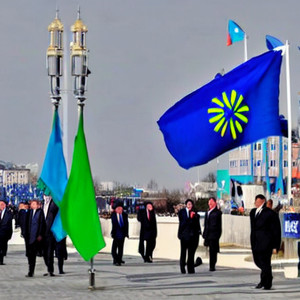
- Moldova’s EU Push and Controversy: A slim majority supported Moldova’s EU accession in a referendum, but economic challenges and historical ties with Russia make this a controversial move.
- Geopolitical Positioning: President Maia Sandu is pushing for EU and NATO integration and closer ties with Romania, aligning Moldova with the West amid tensions with Russia.
- Economic and Domestic Strain: Economic issues and public unrest, including farmer protests and energy shortages, have raised questions about Moldova’s readiness for EU accession.
Moldova, a southeastern European nation and former Soviet republic known primarily for its agricultural sector, held twin votes on October 22. The presidential elections coincided with a referendum on EU accession, announced by incumbent President Maia Sandu. In the closely contested referendum, 50.46% of voters approved EU accession. However, in the presidential elections, Maia Sandu did not secure the required 50% majority, leading to a second round of elections on November 3, where pro-EU President Sandu won with the support of diaspora votes.

It’s important to note that EU accession does not mean Moldova will immediately become an EU member. The referendum is only a constitutional change, which, if adopted, would make EU accession a national priority and a constitutional commitment for Moldova’s government.
Maia Sandu, Moldova’s President, is a pro-West candidate who advocates for EU accession and NATO membership. She has voiced strong support for Ukraine and proposed a union state between Romania and Moldova, citing their shared Roman history. Sandu argues this union would benefit both countries’ security, as Romania is a NATO member and hosts the largest NATO deployment in Eastern Europe. By seeking closer ties with Romania, Sandu aims to bring Moldova under NATO’s nuclear umbrella as a safeguard against Russia.
Western countries have long been interested in Moldova due to its geopolitical importance. NATO members are eager to establish a stronger presence in Moldova, explaining the growing ties between Western nations and the Moldovan president. This was especially evident in February, when Moldova hosted the European Union Peace Summit. This was the first time in European history that such a summit took place in a non-EU country, highlighting Moldova’s commitment to the West and the West’s desire to bring Moldova into its sphere.
Sandu’s policy is assertive. She has openly criticized Russia, accusing it of meddling in Moldovan elections to prevent EU accession. She also accuses Russia of fueling internal political rivalries and creating unrest within the country.

However, Sandu’s call for EU integration and her stance on severing ties with Russia have been controversial. Many Moldovans still feel an affinity for Russia and do not want to be caught in the West-Russia geopolitical struggle. Additionally, this shift has economic implications, as Moldova has benefited from discounted Russian oil for decades. Following the Ukraine war, Sandu quickly aligned with Western partners, cutting off gas imports from Russia, which has led to significant economic challenges.
The economic issues in Moldova are severe, with the country struggling to provide electricity to its citizens. This has led to protests, particularly from Moldovan farmers who are frustrated by the economic policies. Ukrainian products, dumped into Moldova’s market, have made it difficult for local farmers to compete, leading to ongoing unrest over the past year. The domestic crisis escalated to the point that, in 2023, Moldova’s prime minister had to resign, as the government could not adequately supply electricity.
Another controversial move by Sandu was the imprisonment of pro-Russian political figure Ilan Shor. Shor, a major competitor in the presidential elections, was jailed on charges of criminal activity, raising concerns about the democratic and constitutional nature of Sandu’s leadership. While advocating for Moldova’s EU integration and entry into a democratic society, she faces accusations of undermining democracy by suppressing opposition.
The key priority for President Maia Sandu should be addressing Moldova’s economic issues and navigating the West-Russia rivalry. Moldova’s best course may be to isolate itself from the conflict. The Ukraine war has created regional instability, turning it into a proxy battleground between Russia and the West. Likewise, Moldova should avoid becoming a proxy state in this geopolitical struggle.
Aayush Pal is a freelance writer on contemporary geopolitical developments. The views expressed in his work are entirely his own.
